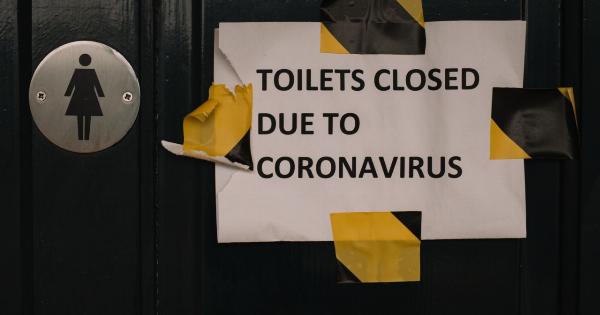When it comes to personal hygiene, many people tend to focus on essentials like washing hands or taking a shower, while neglecting the cleanliness of the toilet.
However, what they fail to realize is that neglecting toilet hygiene can have serious consequences on their health and well-being. From the spread of highly contagious diseases to the breeding ground for harmful bacteria, a dirty toilet can become a risky game that no one wants to play.
In this article, we will explore the various reasons why neglecting toilet hygiene is a dangerous mistake that should not be taken lightly.
The Spread of Highly Contagious Diseases
A toilet bowl is a common breeding ground for a wide range of viruses and bacteria. When toilets are not regularly cleaned, these microorganisms can thrive and pose a significant risk to anyone who uses the facility.
Highly contagious diseases such as norovirus, hepatitis A, and the common flu can easily spread through contact with contaminated surfaces in the toilet area. Poor toilet hygiene practices, such as not flushing properly or not washing hands after using the toilet, can amplify the risk of spreading these diseases among individuals.
Increased Risk of Urinary Tract Infections
Proper toilet hygiene is especially important for women to prevent urinary tract infections (UTIs). Neglecting toilet hygiene can lead to the growth of E.
coli bacteria, which is commonly found in feces and can easily contaminate the toilet seat if not cleaned properly. When women sit on a contaminated toilet seat, they are at a higher risk of contracting UTIs.
Furthermore, improper wiping techniques or not washing hands after using the toilet can also contribute to the spread of bacteria and increase the likelihood of developing UTIs.
Unpleasant Odors and Poor Air Quality
A dirty toilet not only poses health risks but also leads to unpleasant odors and poor air quality in the surrounding area.
When toilets are not regularly cleaned, the buildup of bacteria, mold, and fecal matter can emit foul smells that are hard to ignore. These odors can be particularly bothersome in public restrooms or shared spaces, impacting the overall comfort and well-being of individuals using the facilities.
Moreover, poor air quality in toilets can also aggravate respiratory conditions, such as asthma or allergies, making it essential to maintain proper toilet hygiene for the sake of everyone’s health.
Potential Infestation of Insects and Pests
A poorly maintained toilet can attract insects and pests, creating an unsanitary environment that further compromises hygiene. Cockroaches, flies, and other insects are attracted to the filth and dampness in a dirty toilet.
When these insects come into contact with hands, they can transfer harmful bacteria to food or other surfaces, leading to potential foodborne illnesses or cross-contamination. Additionally, the presence of pests in toilets can be highly unpleasant and disruptive, making it important to prioritize regular cleaning and maintenance to avoid infestation.
Impact on Mental Well-being
Aside from physical health risks, neglecting toilet hygiene can also have an impact on mental well-being. A dirty and unkempt toilet can create a sense of discomfort and anxiety for individuals using the facilities.
It may lead to feelings of disgust, embarrassment, or even shame, especially in shared spaces or public restrooms. Poor toilet hygiene can also contribute to a negative perception of cleanliness and can reflect poorly on the overall hygiene standards of an establishment or individual.
By prioritizing toilet hygiene, individuals can maintain a sense of cleanliness and improve their mental well-being when using public facilities.
Ineffective Cleaning Techniques
Even when individuals are aware of the importance of toilet hygiene, inefficient cleaning techniques can undermine their efforts. Using improper cleaning products or neglecting certain areas of the toilet can leave behind hidden bacteria and germs.
It is crucial to use appropriate disinfectants, specialized toilet cleaners, and clean tools to thoroughly sanitize the toilet. Neglecting regular cleaning schedules can also contribute to a buildup of germs and make it even harder to maintain hygiene in the long run.
Contamination of Personal Belongings
Another significant risk of neglecting toilet hygiene is the contamination of personal belongings.
When toilets are not properly maintained, bacteria and germs can easily transfer onto items such as mobile phones, wallets, or handbags that are placed on unsanitary surfaces. This can lead to the spread of harmful bacteria to hands or items used in daily routines, potentially causing illness or infections. Therefore, it is important to practice good hygiene habits and keep personal belongings away from unsanitary areas.
Preventing Antibiotic Resistance
The global concern of antibiotic resistance emphasizes the importance of maintaining proper toilet hygiene. Overuse or misuse of antibiotics can contribute to the development of drug-resistant bacteria.
In an unsanitary toilet environment, this risk is heightened, as bacteria can thrive and be spread easily. By prioritizing toilet hygiene and reducing the likelihood of infections, we can minimize the need for antibiotics and contribute to the fight against antibiotic resistance.
Healthier and Safer Communities
Regular cleaning and maintenance of toilets are not only essential for individual health but also important for promoting healthier and safer communities.
Public restrooms, schools, workplaces, and other shared spaces should prioritize toilet hygiene to prevent the spread of diseases and maintain a clean environment for everyone. By collectively recognizing the significance of proper toilet hygiene, we can create a positive impact on public health, reduce healthcare costs, and contribute to the well-being of our communities.
The Takeaway
It is clear that neglecting toilet hygiene is a risky game with numerous potential consequences.
From the spread of highly contagious diseases to the impact on mental well-being, there are compelling reasons to prioritize toilet hygiene in our daily lives.
By following proper cleaning techniques, practicing regular maintenance, and raising awareness about the importance of toilet hygiene, we can mitigate health risks, improve sanitation standards, and create healthier environments for ourselves and those around us.































